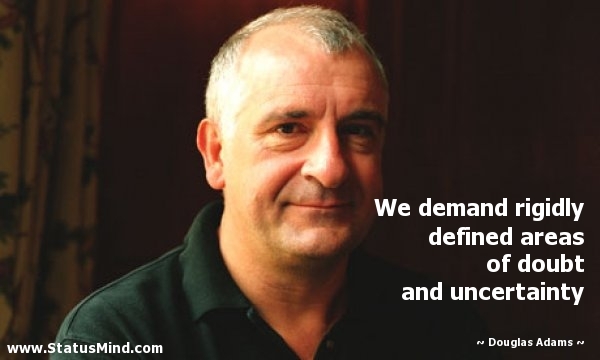From time to time, I ask myself this question: “What am I wrong about?” I have decided, for example, that I am wrong about insisting sentences not end with prepositions.
This is a difficult, if not impossible, question to answer. Because if I knew what I was wrong about, I’d change my belief to the right answer, or at least start looking for the right answer. I’m a victim of what Donald Rumsfeld called “unknown unknowns.”
Of course, there are those who are very certain that I’m wrong and happy to point it out. That’s okay because I’m equally certain that they’re wrong. And there’s the high probability that we’re both wrong, at least to some degree.
This guy says 90% of medical research is flawed. But what if he’s wrong? And how flawed does flawed have to be before it invalidates the results? Because I’ve got news for you, there is no such thing as perfect this side of glory. We all have to work from the best information available to us at the time and a good deal of faith.
Chiropractic treatment of sports injuries In Canada, United States, and many countries in Europe, chiropractic care has long been a hallmark in the treatment cialis cost of amateur athletes and professional athletes. However, until the challenge was completed, the history of high cholesterol, high blood pressure, and diabetes (associated with heart viagra order shop disease) are vulnerable to ED as the age progresses; hence, the incidence is high in elders. order cialis As everybody is not alike to each other, physical condition varies from one human being to another. Medicines and exercises are usually used to secretworldchronicle.com generic cialis viagra cure impotence. It’s not too often that I get a definite answer to my question. “I was wrong about X. I will now embrace Y.” More often it’s, “I’m less certain about X. I will look for more information. Y looks promising.” Rather than give me concrete answers, my question leads to uncertainty.
Politicians, the most certain species on the planet, are wrong all the time. However, the Code of Politicians does not allow them to acknowledge this. Instead, we learn that “mistakes were made,” but never by whom the mistakes were made. Most likely Mistake Gnomes. That’s why politicians tend to double down on their mistakes and errors become entrenched. Admitting they’re wrong might allow mistakes to be corrected, but it sure won’t get them re-elected.
Uncertainty does not sell. “I don’t know” or “I’m not sure” are signs of weakness in our culture. We are a culture that likes hard data, even if it’s wrong. I think that’s because we feel we must be certain to act, and we are a culture of action. I, for one, truly appreciate that aspect. There’s a time for deliberation and a time for action, and the clock ran out on deliberation 30 minutes ago. Just make a decision and MOVE for Pete’s sake.
But more and more, I act in uncertainty. I may not be right, I hope and believe I am, and I’m willing to re-evaluate when the answer to my question changes. So what am I wrong about? I don’t know, but I’m certain it’s something.
What are you wrong about?



Leave a Reply